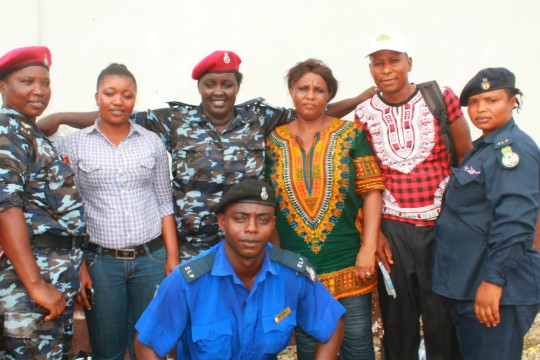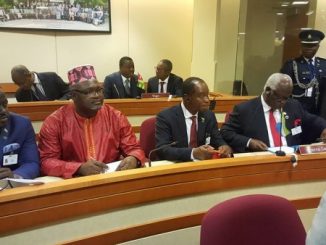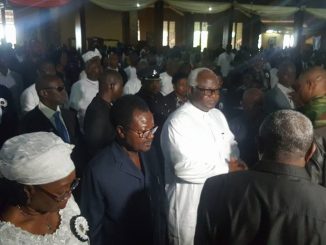
Public-police partnership is necessary for effective community policing and service delivery. © UNDP Sierra Leone
Only a week after WHO declared the end of the Ebola epidemic in Sierra Leone, the Inspector General of Police (IGP), Francis Munu has over the weekend launched the Community Policing Project in the border district of Kambia.
Affirming, in front of a large representation of community leaders and ordinary resident, the IGP said that the police is “A new and professional police force committed to providing best professional service.” Adding “Police cannot be an effective and modern police force if we do not work closely with the community. The Sierra Leone Police is a modern police force seeking to provide excellent professional service to the country and your communities. Policing is a service. It is a service to the country. We will ensure that we provide you with the best professional service.” He said amidst thunderous applause from the over 200 people who gathered in a jam-packed hall.
United Nations Development Programme (UNDP) supports the Community Policing Project with funding from Government of Japan. Kambia is a major border district sharing a long international boundary with Guinea as well as long standing and deep socio-cultural and economic ties between the two countries.
With the outbreak of Ebola in the Mano River Union countries, which started in Guinea and the fact that the epidemic is still not over in Guinea, the need for strong security screening and high alert in the border areas, is not only significant for preventing any further Ebola case crossing the border, but also addressing the rising trans-national crime taking root in the West African region.
UNDP has been supporting the strengthening of Sierra Leone Police since 2004 under various projects. Immediately following the war that ended in 2002, UNDP supported the SLP to restore services in areas devastated after the war as well as supported extensive training to enhance the effectiveness of case management and prosecution to help fast track backlog cases under its Access to Justice Programme. Since 2010 UNDP helped strengthen the police to investigate and prosecute sexual and gender based violence issues, developing a case management manual on sexual and gender based violence (SGBV) and strengthening the Family Support Unit.
The latest support under the Security Sector Reform projects seeks to enhance peace preservation and conflict prevention through better community relations with the police and other security services. The projects has also helped strengthen border management mechanism and provision of logistics and training for more effective community needs policing.
UNDP Police Adviser, Mona Nordberg informed the gathering that the project will cover the three border chiefdoms of Magbema, Gbinle Dixing and Samu, adding that the concept is not new in Sierra Leone. She noted “The Sierra Leone Police has already been implementing the concept of Local Needs Policing, specifically in cooperation with the Local Policing Partnership Board, Area Policing Partnership Committee, Zonal Policing Partnership Committee, and Community Safety Volunteers among others.
Ms. Nordberg noted however that the new project, is an “Additional step towards enhancing trust and partnership between the police and the communities, and also include the communities in improving security and safety and to prevent and fight of crime.”
Adrian Roberts from the International Security Advisory Team (ISAT) informed that the Community Policing concept which ISAT is also supporting will ensure that ordinary people in the villages have personal relationships with the police and can interact with them so that through this joint cooperation between the communities and police will ensure greater security.
Assistant Inspector General and Director of Gender Affairs at the Sierra Leone Police, Elizabeth Turay said that the police is taking gender considerations very seriously both in their method of policing and in the recruitment of senior cadres.
UNDP Team Leader for Governance, Annette Nalwoga noted the timing of the project is significant especially as Sierra Leone begins its recovery following the Ebola epidemic which heavily impacted the functioning of key Government institutions like the Police.
Ms. Nalwoga further said “As Sierra Leone works towards recovering better from the Ebola epidemic, UNDP is confident that community policing will play a significant role in bringing communities together and enhance peace after the Ebola epidemic where conflict with security forces and communities where inevitable especially where restrictions of movements of people and quarantining of homes and communities proved difficult as the country was grappling to stem the spread of the virus.”
UNDP was tasked by the UN Secretary-General to lead the UN’s crisis recovery work in the three hardest-hit countries of Guinea, Liberia and Sierra Leone. In Sierra Leone, whilst continuing to support the country’s efforts to stay at zero Ebola cases. UNDP helped the government develop the country’s National Ebola Recovery Strategy.
UNDP’s own recovery action plan, titled ‘Restoring Livelihoods and Fostering Economic Recovery’ spans 18 months, and supports the country’s recovery efforts with a focus in helping rebuild the livelihoods of those most affected, strengthen the government’s capacity to restore essential services and to ensure a rapid return to a sustainable development path, while preserving and promoting peace, stability and social cohesion.
For mor information or interviews, please contact:
UNDP Communications Unit
55 Wilkinson Road, Freetown.
Email: [email protected]



